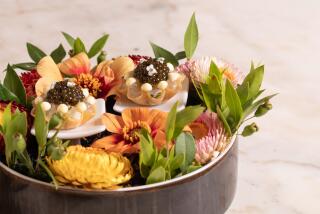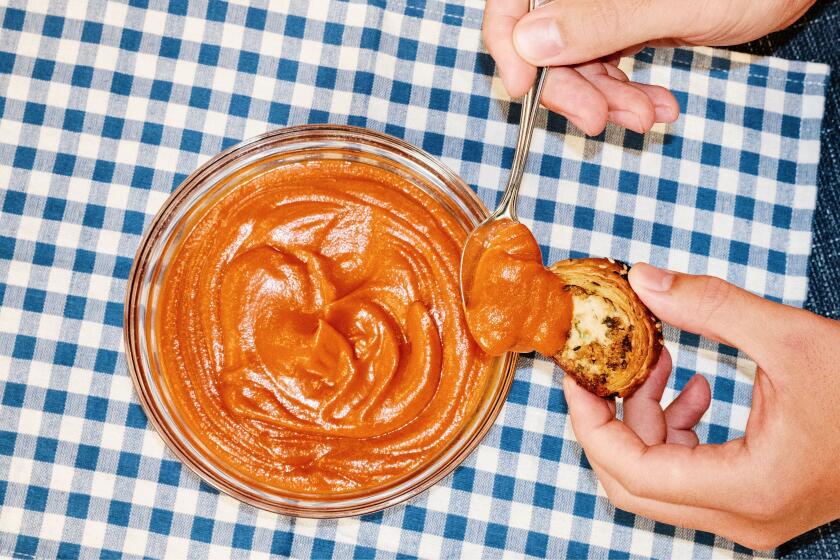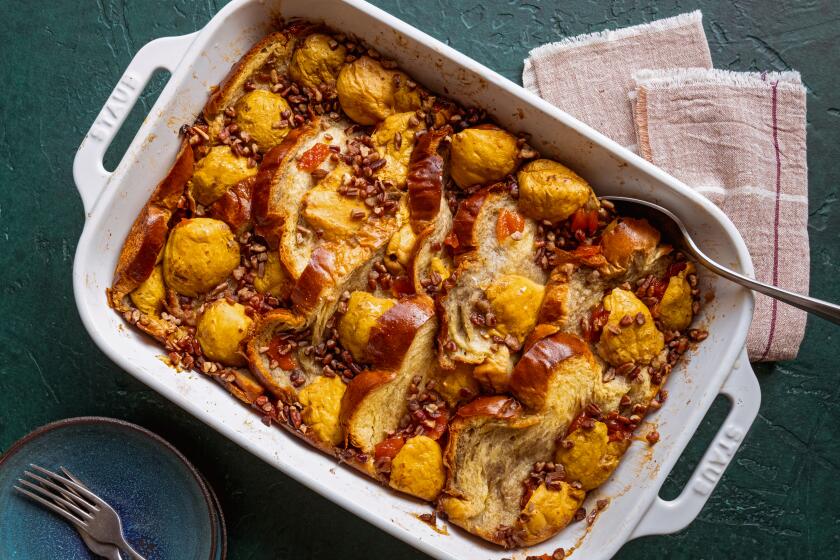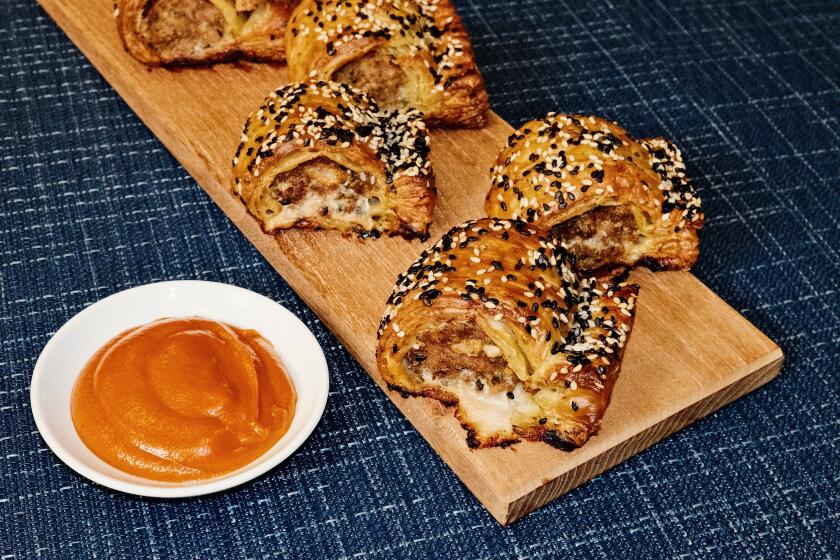Raising <i>limoncello’s</i> appeal
It’s easy enough to freehand your way into a decent bottle of limoncello. All you need is a generous handful of lemon zest, a neutral spirit, some sugar and a couple of days of infusing patience. But to Ventura Limoncello’s co-owner James Carling, decent is hardly the same as delizioso, at least in the eyes of his Italian in-laws.
“You have to watch each lemon, step by step,” says his mother-in-law, Rossana Zaretti, in Italian-soaked English as she runs a citrus peeler from the top to the bottom of a locally grown Eureka lemon. She looks up at her son-in-law before continuing, “No pith.”
Carling, who grew up in New York City, handles the day-to-day business operations at the Ventura industrial park production facility. But he knows it is the women at this small, family-owned limoncello house who really run the show. Several days a week, Zaretti serves as the pith warden, inspecting every lemon peel for traces of spongy white residue while her daughter, Manuela Zaretti-Carling (James’ wife), makes sure every drop of the canary-yellow liqueur gets her final tasting approval.
It’s up to Carling to figure out how to turn the ubiquitous Italian trattoria digestivi into a regular happy-hour special in cocktail-obsessed Los Angeles.
But first, there is that bitter pith to deal with.
“In Italy, everyone makes limoncello because most of the commercial ones there have gotten so bad,” says Manuela, a petite brunette who spends her summers in Italy visiting family with the couple’s teenage son (Carling stays behind during much of the summer to manage the business). She blames commercial lemon-peeling machines for the inconsistent quality among Italian imports. “They leave on too much pith.”
In her genes
Manuela gets her passion for handmade liqueurs from her parents, who emigrated from Rome to the community of Oak Park in the late 1970s when she was a child (her father’s brother owned several Italian restaurants in the Los Angeles area). Ventura County wasn’t exactly Rome, but the Zarettis found plenty of lemons in their backyard to remind them of home. Enough to keep the family dinner table and Il Salotto, the Italian restaurant they owned in Tarzana in the 1990s, well stocked with bottles of homemade limoncello.
Carling, a self-proclaimed novice digestivi drinker until he married into the family, was the one who wanted to start a fruit liqueur company. “I kept thinking, ‘How is it possible that we’re in Ventura County, and there’s no limoncello or other fruit liqueur made here?’” he recalls. Ventura County is the largest lemon producer in the United States, according to the U.S. Department of Agriculture.
Manuela shoots her husband a furtive glace from the peeling line. “She thought I was a little crazy.
“Plus, Ventura is a really big Italian family name,” he adds.
Three years ago, Carling quit his job in the consumer catalog industry to focus on making limoncello. But finding prime ingredients to fuel a spirits company turned out to be trickier than hand-picking lemons from the family’s backyard tree.
“Here, [farmers] are concerned about the juice, not the skins,” Manuela says, tossing a lemon into a plastic dump bucket. The peeled lemons will be returned to their suppliers and composted for fertilizer.
“Growers pick lemons while they’re still green and wax them so they can be sent to huge packing houses to sit for months,” Carling adds. The Carlings needed tree-ripened, preservative-free fruits rich with lemon oils to make a limoncello up to their exacting standards.
Two Ventura County growers, Petty Ranch and Limoneira, agreed to set aside a small number of fully ripe Eureka and Lisbon lemons grown to Ventura Limoncello’s specifications. (Eurekas are a 19th century hybrid of an Italian lemon that was first planted in Los Angeles; Lisbons originated in Portugal.) “Both have skins that are packed with oil and very similar to the Sfusato lemons used in Italy for limoncello,” Carling says.
Every two weeks, Rossana and Manuela fill several 20-liter glass pickle jars about halfway with lemon peels and top off the jars with pure grain alcohol. After a few days, Manuela strains out the peels and adds simple syrup to sweeten the mix and lower the alcohol content.
Carling makes sure he gets those lemons to the kitchen on time, but otherwise he takes a back seat on the production line. “I’m not allowed to peel anymore,” he says. Carling and his father-in-law, Pietro Zaretti, have staffed the two-person bottling line since that first batch was ready in early 2008.
He isn’t the only family member to be banished from the kitchen. When Rossana’s sister visited recently from her home in Civitanova Marche, a small town along Italy’s central coast, she was dismissed for her subpar peeling performance. “I fired her,” says Rossana matter-of-factly.
Selling points
Carling spends most of his time figuring out how to sell an Italian-style after-dinner drink in a country more prone to before-meal cocktails. “People don’t even know what a digestif is here,” he says. “You have to put it in a cocktail sort of perspective for them.”
When dropping off bottles of limoncello at local Italian restaurants failed to create a buzz, he knocked on the door of restaurants with mixology programs, armed with a sales pitch about a new locally made cocktail ingredient. So far, it’s been working.
Michael Shearin, beverage director at Drago Centro downtown, makes a Prosecco cocktail with a splash of Ventura Limoncello, Cognac, vermouth and fresh lemon juice. Nick’s Martini Lounge in Beverly Hills, Nobu West Hollywood and several Ventura area-restaurants also use the elixir in their cocktails.
Even so, Carling wonders whether his family’s pith-free dedication has created a new problem. “These [bartenders] are saying that they only need a splash of our limoncello because it’s so lemony, which means you don’t sell as much,” he says, adding that he would never interfere with his mother-in-law’s peeling technique. “I take it as a compliment.”
Carling is not entirely convinced some things, like Manuela’s penchant for following her taste buds rather than a recipe, are going to work out as well in the production kitchen as they did at home (Manuela adds more or less simple syrup to each batch depending on the vibrancy of the lemon flavor). “It’s a commercial product now, so eventually we’re going to have to use a recipe and make [the limoncello] the exact same way every time.”
Carling pauses for a moment and reconsiders. There is more than just limoncello on the line.
“I made the mistake of bottling a batch once that had not been approved by Manuela,” he says, smiling at his wife. “Believe me, I will never do that again.”
Ventura Limoncello, https://www.venturalimoncello.com or (805) 658-0881. Available at many liquor shops including Wine Expo in Santa Monica, K&L Wine Merchants in Hollywood and BevMo.
More to Read
Eat your way across L.A.
Get our weekly Tasting Notes newsletter for reviews, news and more.
You may occasionally receive promotional content from the Los Angeles Times.










